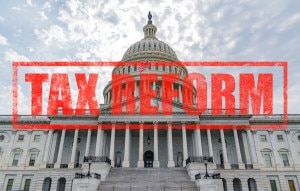Forget about all those dire warnings that home values will take a hit thanks to the GOP’s tax bill. Instead, it’s time to start worrying about already high home prices getting even higher and more unsustainable than before.
Sure, the sprawling tax scheme pares down some long-standing perks of homeownership, especially in blue states like Massachusetts, though less dramatically than first proposed. At one point, the National Association of Realtors predicted that homeowners in Massachusetts and other pricey states could see median home prices drop by tens of thousands of dollars.
But some of the more obscure provisions tucked into the sprawling tax bill could have an even bigger impact, providing a perverse incentive that, in a market starved for listings, will keep many homeowners locked in place instead of selling and trading up. And while the affordable housing sector dodged a devastating hit, the overall bill will only further erode efforts to build lower-cost apartments and homes.
Beyond such poison pills in the bill itself, another not inconsiderable reason the new tax bill is likely to drive home prices up to new levels of unsustainability is the borrow-rashly and spend-bigly example it sets for the entire economy, as it appears likely to pile on another $1.5 trillion to the national debt.
Easily the most reckless president our country’s history, Trump and our Republican-controlled Congress appear determined to pump cash into an already growing economy, budget concerns be damned, in a desperate bid for cheap votes and a “legislative victory.”
And that can only fuel all sorts of speculative, bubble-like behavior that bodes ill for the sector housing, which is particularly susceptible to boom and bust cycles.
On paper it certainly looks like the real estate industry dodged a bullet. Thanks to an all-out lobbying push by NAR, a proposal to lower the limit for the mortgage interest deduction from $1 million down to $500,000 was nixed in place of a less severe drop to $750,000.
Instead of getting rid altogether of the deduction for local and state property taxes – very important in Massachusetts and other high-cost states – a $10,000 cap was put on it.
Also dropped out of the final tax plan was a move to ax a popular tax credit used to finance affordable housing, staving off the loss of as much as 1 million in new lower-cost apartments and condos over the next 10 years.
But read a little closer and you realize the Republican tax plan, rushed through Congress in record time, inadvertently creates new incentives that could make an already drum-tight real estate market even tighter.
Poof Goes The Deduction
If you have over $750,000 in mortgage debt, you can hang onto that deduction by staying in place, with the tax bill grandfathering in current homeowners with big loans. But if you want to move up and buying something bigger, the deduction goes poof. That’s a disincentive at the top of the market that will ripple down as some wealthier homeowners stay put.
The $10,000 cap on the deduction for state and local taxes is an even bigger disincentive to move. That definitely could discourage some homeowners interested in moving to more expensive communities with better school systems that also happen to have higher property tax bills.
That will mean fewer listings in a market where the number of homes for sale is well below that of a healthy market. And as any buyer knows, it’s the shortage of homes for sale that is a key driver behind rising prices, with the number of homes for sale in Massachusetts half or less than what it was a decade ago.
Paul Yorkis, president of the Massachusetts Association of Realtors, says he is still concerned about the tax bill triggering a decline in home values as opposed to pushing prices higher, though it will take some time to play out.
But he also acknowledged that other provisions provide incentives for homeowners to stay put – bad news in a market sorely lacking enough homes for sale.
“We have an incredible housing shortage and this legislation does nothing to encourage more housing production at all, and encourages people to stay where they are to take advantage of the tax benefits,” Yorkis said.
The other big factor is the lack of new construction. And while the affordable housing sector has avoided a crippling blow, the fact that the tax bill is set to blow up the federal deficit will in the long run ramp up pressure to cut federal housing programs.
But it’s not just what’s in the tax bill that spells trouble ahead. It’s the message Trump & Co. is sending to the economy and to the country at large with the decision to go on a $1.5 million tax-cutting spree financed by a huge increase to the federal debt. The bill, both in its actual provisions and its larger spirit, is a burst of rocket fuel for all sorts of speculative schemes and bubbles, from stock prices to bitcoin.
The stated aim of the cut is to create more jobs in hopes companies will plough that money back into their core businesses. The more likely result, though, is that all that cash flowing back into the corporate coffers will be used to pad CEO pay and buy back stock, further fueling the increasingly irrational gains on Wall Street.
And don’t think the real estate market is immune to this rot. Sure, it’s been fairly tame after the drubbing it took in the aftermath of the Great Recession and the subprime market meltdown. But some of that extra cash unleashed by Trump’s huge borrow-and-spend tax plan will likely spill over into the real estate market, spurring a new generation of schemes and scams and further pumping up prices.
And really, what’s to stop it? It’s not as if there’s anything for the fraudsters and faux developers to fear from the federal government, such as it is.
After all, our country is led by one of the all-time greats when it comes to irresponsible real estate schemes financed by other people’s money.




 |
| 





